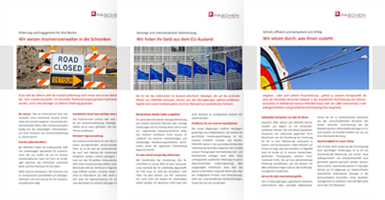Latest News / Entry
BvCM Working Group Insolvency Practice in Hamburg with AON
It remains an unpopular topic: Although each and every company has to deal with it intensively since the introduction of stricter regulations in May last year, data protection is an area that unsettles many, despite or precisely because of its importance and necessity – too complex, too complicated, too unclear the handling.
At the most recent meeting of the Bundesverband Credit Management’s (BvCM) Working Group Insolvency Practice with AON Versicherungsmakler Deutschland GmbH in Hamburg on 21 February 2019, attorney Matthias Marzluf shed light on the situation and conveyed the positive message to the participants: It’s not so bad after all.
According to Marzluf, the greatest challenge in the processing and archiving of customer data is probably the tension between the data protection requirements for the deletion of sensitive data and the requirement to be able to provide these in the event of an avoidance of transactions in insolvency proceedings and therefore to have access to them. He explained how this balancing act can succeed: On the one hand, by obtaining the necessary data protection consents from the customers and, on the other hand, by taking into account the time requirements for the deletion of personal data.
Attorney Michael Schmidt, head of the working group, concentrated in his lecture on current developments in the reformed right to contest, as first court decisions under the new law have now been issued. In particular, Schmidt dealt with a decision of the Regional Court of Aachen and gave valuable practical advice on how to proceed with customers with a liquidity crisis in order to avoid transactions in insolvency proceedings. According to his assessment, the first positive signals from the jurisdiction concerning a change of mentality in the subject of avoidance of transactions in insolvency proceedings triggered by the reform of appeal can be recorded. Host Kai Engelsberg, however, gave an insight into the subject of supplier credit and explained in detail and comprehensibly which factors matter in allocating the contract.
Are we facing a wave of insolvencies? A question that even Michael Bretz of the Creditreform Association is unable to answer with certainty. However, he is able to estimate the probability of the increase in insolvencies forecast by many market participants: On the basis of numerous clear graphs, he provided comprehensive background information on the over-indebtedness and insolvency situation of consumers and companies in Germany – in an excursus also on a European level – which allowed one’s own assessment. Bretz himself expects a moderate increase in insolvencies. In addition, his explanations on the economic effects of the Brexit, supported by detailed figures, were of great interest to the participants.
A well-organized, entertaining event with competent speakers and interesting topics, as the numerous Credit Managers concluded.



